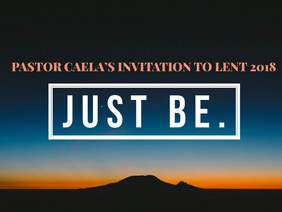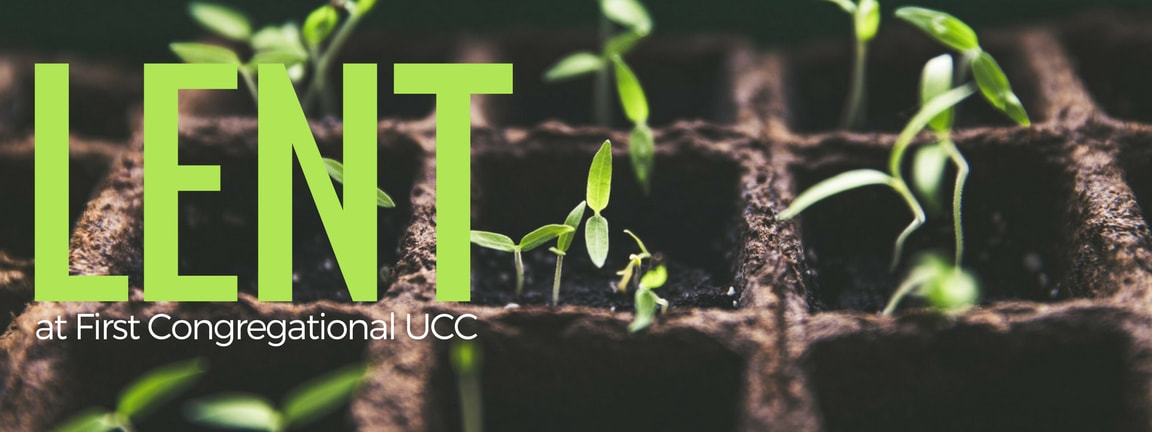 Lent is traditionally a time in the church year where we start to think about “making changes.” Traditionally, Lent has been a time of fasting, penance, sacrifice. As a child growing up in a community where Lent was taken quite seriously, it was common to hear kids at school say, “So…what are you giving up for Lent this year?” There are folks for whom giving something up is very meaningful and find a deepening of their faith through that practice each year. If that’s you, I say GO FOR IT. Other folks approach Lent by “making changes” by adding something in. Perhaps they commit to a new prayer practice or find an outlet for community service. Again, this seems like a lovely practice for Lent. Adding something in with the desire to deepen your faithful roots into the ground is what it’s all about. Lent is a time for lengthening, sending our roots deep down into the fertile soil that is about to wake. Lent is a time for ripening, waiting patiently for warmer days to come as we quietly and carefully lay the foundation for new life and growth. If adding something in helps you grow and deepens your connection to the Holy, I say GO FOR IT. For those wanting to try something new this year, or those “just not feeling it” as Lent approaches – I have another possibility for you. How about a year where your Lenten practice is to Just Be? Father Richard Rohr wrote an article, “Lent is About Transformation,” back in 2012. In it, Fr. Rohr says that, too often, Lenten practices are about making changes, not about being changed. This whole practice of following Jesus is about transformation – about allowing our very form to be altered on a foundational level – not just about making surface-level changes. Sometimes, of course, the practice of living in new ways leads to foundational shifts. I think that’s what we are often seeking when we give something up or add something in for Lent. When that works, it’s a powerful, powerful thing. Sometimes, though, what we need (perhaps especially in a world that is always changing) is less movement and more stillness, fewer changes and more steadiness. Sometimes we don’t need to radically alter ourselves. Sometimes we simply need to be present and allow. This is not a passive waiting. This is an active, intentional way of grounding ourselves in each moment and inviting an awareness of God’s presence in our lives. This be-ing requires careful self-discipline and awareness. In his book Everything Belongs: The Gift of Contemplative Prayer, Fr. Rohr says, “Be still and know that I am God. Be still and know that I am. Be still and know. Be still. Be.” Be. It’s a radical invitation in a world where we are told we need to be constantly in motion. It’s a radical invitation when our whole lives are built around the never-ending cycle of producing and consuming. It’s a radical invitation to rest in God’s presence and learn to simply be present. To honor the holiness of each passing moment. To be inspired by something as beautiful as our own breath. To stop striving, working, moving. To just BE. I’m not suggesting, incidentally, that you try to Just Be 24-7 during Lent. I’m pretty sure that’s not possible. But I am going to work this year on Just Be-ing during short daily meditations. You might decide to Just Be during conversations with your loved ones at the dinner table. Or maybe you want to Just Be when that negative voice starts to play in your head. Perhaps you want to Just Be in nature, or in worship, or at the gym. I think it can be done anywhere, really. It’s about a quality of awareness we bring to each moment as holy – nothing more, nothing less. However you observe this season of lengthening that we call Lent, know that I will be praying for you as you seek wholeness and growth on this journey towards Easter. Pastor Caela Lent begins February 14th. Learn more about Lent at First Congregational UCC. Comments are closed.
|
News Archives
January 2024
Categories
All
ConnectPrint
|

